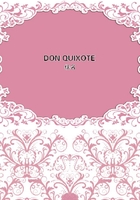
第392章
THE duke and duchess had no reason to regret the joke that had been played upon Sancho Panza in giving him the government; especially as their majordomo returned the same day, and gave them a minute account of almost every word and deed that Sancho uttered or did during the time; and to wind up with, eloquently described to them the attack upon the island and Sancho's fright and departure, with which they were not a little amused. After this the history goes on to say that the day fixed for the battle arrived, and that the duke, after having repeatedly instructed his lacquey Tosilos how to deal with Don Quixote so as to vanquish him without killing or wounding him, gave orders to have the heads removed from the lances, telling Don Quixote that Christian charity, on which he plumed himself, could not suffer the battle to be fought with so much risk and danger to life; and that he must be content with the offer of a battlefield on his territory (though that was against the decree of the holy Council, which prohibits all challenges of the sort) and not push such an arduous venture to its extreme limits. Don Quixote bade his excellence arrange all matters connected with the affair as he pleased, as on his part he would obey him in everything. The dread day, then, having arrived, and the duke having ordered a spacious stand to be erected facing the court of the castle for the judges of the field and the appellant duennas, mother and daughter, vast crowds flocked from all the villages and hamlets of the neighbourhood to see the novel spectacle of the battle; nobody, dead or alive, in those parts having ever seen or heard of such a one.
The first person to enter the-field and the lists was the master of the ceremonies, who surveyed and paced the whole ground to see that there was nothing unfair and nothing concealed to make the combatants stumble or fall; then the duennas entered and seated themselves, enveloped in mantles covering their eyes, nay even their bosoms, and displaying no slight emotion as Don Quixote appeared in the lists. Shortly afterwards, accompanied by several trumpets and mounted on a powerful steed that threatened to crush the whole place, the great lacquey Tosilos made his appearance on one side of the courtyard with his visor down and stiffly cased in a suit of stout shining armour. The horse was a manifest Frieslander, broad-backed and flea-bitten, and with half a hundred of wool hanging to each of his fetlocks. The gallant combatant came well primed by his master the duke as to how he was to bear himself against the valiant Don Quixote of La Mancha; being warned that he must on no account slay him, but strive to shirk the first encounter so as to avoid the risk of killing him, as he was sure to do if he met him full tilt. He crossed the courtyard at a walk, and coming to where the duennas were placed stopped to look at her who demanded him for a husband; the marshal of the field summoned Don Quixote, who had already presented himself in the courtyard, and standing by the side of Tosilos he addressed the duennas, and asked them if they consented that Don Quixote of La Mancha should do battle for their right. They said they did, and that whatever he should do in that behalf they declared rightly done, final and valid. By this time the duke and duchess had taken their places in a gallery commanding the enclosure, which was filled to overflowing with a multitude of people eager to see this perilous and unparalleled encounter. The conditions of the combat were that if Don Quixote proved the victor his antagonist was to marry the daughter of Dona Rodriguez; but if he should be vanquished his opponent was released from the promise that was claimed against him and from all obligations to give satisfaction. The master of the ceremonies apportioned the sun to them, and stationed them, each on the spot where he was to stand.
The drums beat, the sound of the trumpets filled the air, the earth trembled under foot, the hearts of the gazing crowd were full of anxiety, some hoping for a happy issue, some apprehensive of an untoward ending to the affair, and lastly, Don Quixote, commending himself with all his heart to God our Lord and to the lady Dulcinea del Toboso, stood waiting for them to give the necessary signal for the onset. Our lacquey, however, was thinking of something very different; he only thought of what I am now going to mention.